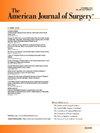不要破坏(血液)银行:全血计划能否最大限度地减少浪费?
IF 2.7
3区 医学
Q1 SURGERY
引用次数: 0
摘要
背景:浪费是创伤患者采用全血(WB)疗法的一个障碍。将老化的全血转换为红细胞单位(RBC)可最大限度地减少损耗:方法:对一家一级创伤中心 2020 年 8 月至 2023 年 3 月期间的血库全血和标准血液制品记录进行了回顾性审查。对需要启动创伤救治并在到达后 4 小时内接受 WB 或 RBC 的患者的治疗效果进行了二次分析。对血液损耗和结果进行了比较:结果:白细胞和 O 型红细胞的损耗率相当(0.7% 对 0.5%)。677 个 WB 单位被输注,668 个被转换为 RBC 输注。9 例浪费,无一例过期。496 名患者符合二次分析标准。168 人接受了白细胞。与成分疗法(COMP)相比,白细胞输血比例更均衡,结果也相似:结论:与 COMP 相比,将老化的白细胞转化为红细胞可减少血液浪费,治疗效果相似,输血比例更均衡。本文章由计算机程序翻译,如有差异,请以英文原文为准。
Don't break the (blood) bank: Can waste be minimized in a whole blood program?
Background
Wastage concerns are a barrier to adopting whole blood (WB) therapy in trauma patients. Converting aging WB to red blood cell units (RBCs) may minimize wastage.
Methods
Blood bank records for WB and standard blood products were retrospectively reviewed at a level 1 trauma center from 8/2020 - 3/2023. Secondary analysis of outcomes for patients requiring trauma activation and receiving WB or RBC within 4 h of arrival was performed. Blood wastage and outcomes were compared.
Results
WB and type-O RBCs had comparable wastage rates (0.7 vs 0.5 %). 677 WB units were transfused, while 668 were converted and transfused as RBCs. 9 were wasted, none expired. 496 patients met secondary analysis criteria. 168 received WB. WB transfusion ratios were more balanced and outcomes were similar compared to component therapy (COMP).
Conclusion
Converting aging WB to RBCs resulted in minimal blood wastage, with similar outcomes and more balanced transfusion ratios compared to COMP.
求助全文
通过发布文献求助,成功后即可免费获取论文全文。
去求助
来源期刊
CiteScore
5.00
自引率
6.70%
发文量
570
审稿时长
56 days
期刊介绍:
The American Journal of Surgery® is a peer-reviewed journal designed for the general surgeon who performs abdominal, cancer, vascular, head and neck, breast, colorectal, and other forms of surgery. AJS is the official journal of 7 major surgical societies* and publishes their official papers as well as independently submitted clinical studies, editorials, reviews, brief reports, correspondence and book reviews.

 求助内容:
求助内容: 应助结果提醒方式:
应助结果提醒方式:


